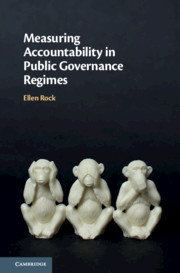Book contents
- Measuring Accountability in Public Governance Regimes
- Measuring Accountability in Public Governance Regimes
- Copyright page
- Dedication
- Contents
- Foreword
- Acknowledgements
- Table of Cases
- Table of Statutes
- Introduction
- Part I Accountability Deficits and Overloads
- 1 Defining Accountability
- 2 Too Little or Too Much of a Good Thing?
- Part II Benchmark of Accountability
- Part III The Complexity of Accountability Systems
- Conclusion
- Bibliography
- Index
1 - Defining Accountability
from Part I - Accountability Deficits and Overloads
Published online by Cambridge University Press: 28 September 2020
- Measuring Accountability in Public Governance Regimes
- Measuring Accountability in Public Governance Regimes
- Copyright page
- Dedication
- Contents
- Foreword
- Acknowledgements
- Table of Cases
- Table of Statutes
- Introduction
- Part I Accountability Deficits and Overloads
- 1 Defining Accountability
- 2 Too Little or Too Much of a Good Thing?
- Part II Benchmark of Accountability
- Part III The Complexity of Accountability Systems
- Conclusion
- Bibliography
- Index
Summary
There is an extensive body of literature addressing the concept of accountability, replete with overlapping definitions. This chapter introduces readers to this wide body of cross-disciplinary literature to provide a picture of areas of agreement and disagreement amongst theorists. Though accountability remains a contested concept, there is general agreement that accountability refers to a relational mechanism that can be analysed within the framework of the questions: who is accountable, to whom, for what, and how? One of the largest unresolved questions about accountability, as explored in this chapter, is whether it is simply a mechanical concept (ie a description of a mechanism with certain attributes) or more broadly reflects a value or ideal (ie the notion of being an accountable person). The conclusion drawn here is that it is particularly difficult to divorce the concept of accountability from a normative background in discussing concepts of accountability deficits and overloads. Each of these concepts rests on the normative assumption that it is possible to identity an ‘ideal amount’ of accountability.
Keywords
- Type
- Chapter
- Information
- Measuring Accountability in Public Governance Regimes , pp. 13 - 24Publisher: Cambridge University PressPrint publication year: 2020



